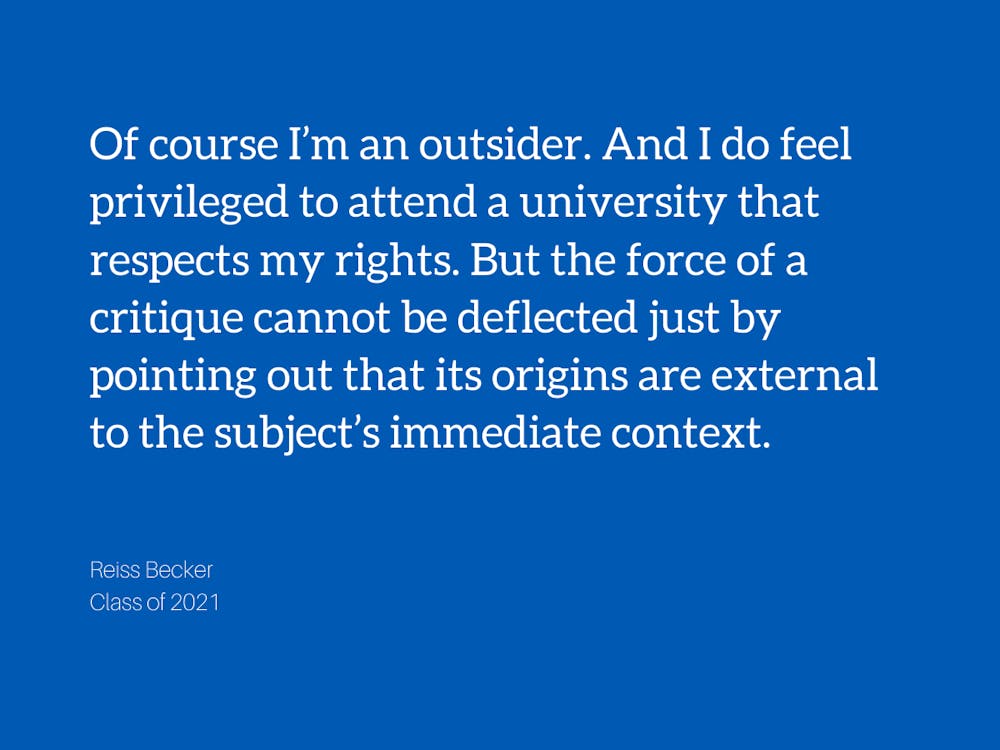In response to my column “Duke Kunshan is a Trojan Horse,” a group of Duke Kunshan students penned a rebuttal, entitled “DKU is a bet on the future of China,” advocating for the sunny side of collaboration with the Chinese Communist Party (CCP). Their initial premise is true. DKU is indeed a bet on the future of China, but it’s a fool’s wager, a venture that was inspired by naive idealism and that will be sustained by unethical self-interest.
The DKU students protest that my argument overlooked their voices, implying a mischaracterization of their motivations for attending DKU in the course of an oversimplified argument that lacked context and couth. Yet my argument was situated within the most important context of all, a context they conspicuously declined to grapple with: the escalating totalitarian depravity of the CCP, their efforts to destroy Uyghur culture and subordinate American institutions. Rather than reflect on the CCP’s crimes insofar as they shape the ethical implications of attending DKU, they tut-tutted, chastising me for my ingracious application of a “Western-centric lens” to the “contradictions and conundrums” that define the modern Chinese police state. Apparently my aversion to oppression is simply sinophobia.
Even so, they have a point, some contradictions and conundrums are at play. That a university committed “to [promoting] an intellectual environment built on a commitment to free and open inquiry” would tolerate a foreign despot censoring classes and banning religious and civic organizations on its premises does represent a contradiction. It is a conundrum, at best, that an institution seeking to “contribute boldly to the international community of scholarship” would do so in cahoots with an amoral dictatorship.
The DKU students attempt to showcase their university’s robust campus discourse by highlighting the popularity and prevalence of Political Science courses. As a Political Science major, I am happy to hear that such classes exist, but their mere existence does not refute my structural critique of DKU. The curriculum at DKU is approved by the Chinese Ministry of Education, a dynamic which obviously enables censorship and thus violates the human right to freedom of expression. As Audre Lorde memorably said: “the master’s tools will never dismantle the master’s house.”
It is similarly encouraging that DKU students can “express opinions and ideas impossible to find at other Chinese institutions.” But should we really be judging DKU by a relative standard where the norm is complete state censorship and the extreme is kinder, gentler state censorship? We should celebrate triumphs of kind, not differences of degree. If only Duke had made a bet on the future of the regions’ liberal democracies, like Japan or South Korea, rather than on its preeminent illiberal autocracy.
Case in point: they concede that “one of the compromises made when establishing DKU was that there would be no political or religious clubs, typical for Chinese universities, where only the Chinese Communist Party (CCP) is allowed.” The rebuttal shrugs at this chilling reality, insisting that university clubs are but one means of expressing political and religious engagement among other informal and state-controlled options. To pacify critics, they assure us that “students work within the gray areas of Chinese policy” to express themselves, as if the presence of a few air holes in a stifling muzzle allows anyone to breathe a sigh of relief. No one should have to rely on oversight to practice their faith, speak their conscience and live a life of dignity.
They accuse me of being an outsider, of “[viewing] the situation from a privileged point of view… not in any way bound or beholden to the policies which govern [them].” I concede both points. Of course I’m an outsider. And I do feel privileged to attend a university that respects my rights. But the force of a critique cannot be deflected just by pointing out that its origins are external to the subject’s immediate context. I assume these same students would not object to someone critiquing Russian repression of homosexuals and sexist Saudi Arabian laws even if that person is not subject to Russian or Saudi law, respectively. Besides, unlike homosexuals in Russia and women in Saudi Arabia, DKU students chose to live under draconian restrictions. They are entitled to defend themselves, but it is wholly legitimate for someone to judge the institution they have freely associated with and deem it immoral.
In a display of close-quarters incoherence, the students question why DKU cannot be a catalyst “for liberalism in a currently illiberal atmosphere” and then, one sentence later, deride the idea that DKU is an “attempt to simply transplant America’s Duke to China.” Make up your mind. Either the task of DKU is to boldly promote Duke’s liberal values in China or it is not. I wish that DKU was the former, that it was an irritating liberal blister disrupting the swift march of the CCP jackboot.
But DKU would not exist if that were the case. Sadly, the reality is far more sinister. For the CCP, DKU is a prestige laundering operation, a perfect advertisement for both China’s “arrival” on the world stage and the considerable sway China exerts over prominent American institutions. For Duke, DKU is integral to a long term strategy to surmount peer institutions––a ploy to show students, donors and the editors of U.S. News that they are “reshaping paradigms,” “encouraging cross-cultural connections” and establishing a novel, “immersive, interdisciplinary educational and extracurricular experience.”
These buzzwords don’t describe the reality, as the DKU students claim: they obscure it. DKU is a deal with the devil—a deeply unethical, mutually beneficial transaction. If the cost of making a bet on the future of China is our values, then we should back away from the poker table and sober up.
Reiss Becker is a Trinity junior. His column, "roused rabble," typically runs on alternate Wednesdays.
Get The Chronicle straight to your inbox
Signup for our weekly newsletter. Cancel at any time.

